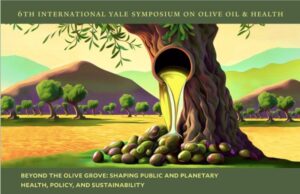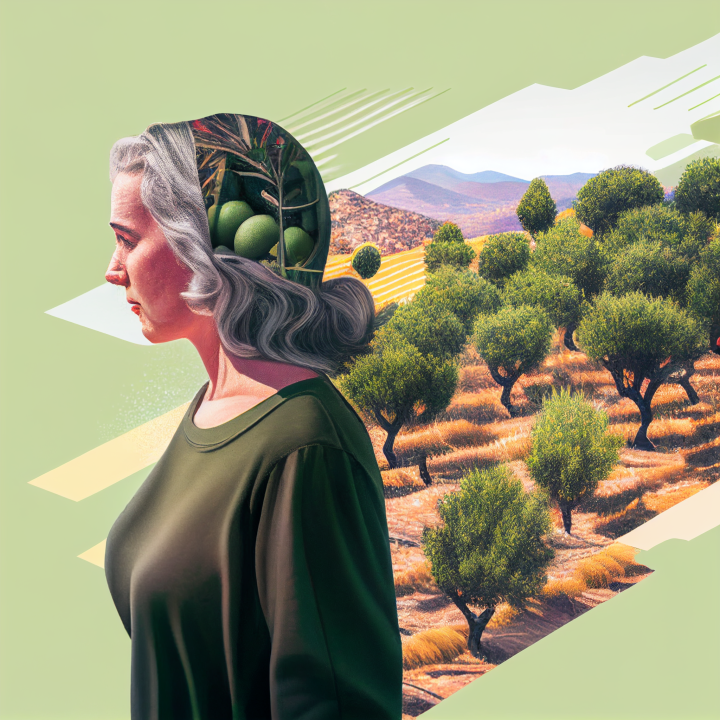Olive Oil Yale Symposium


“BioCoS, is driven by the passion for science and understanding the origins of life. Food, specifically olive oil, is at the very heart of this concept. The company’s innovative approach to address sustainability in food industry is demonstrated through their recent initiative of conducting the first geo-genetic mapping of Greek women producers. “We wanted to not only highlight the growing role of women in this industry, but also their determination in preserving its history, and to communicate the authentic story of their orchards” explains Arhondakis.
By collaborating with these women, BioCoS supports the goal of promoting socially, environmentally, and economically sustainable olive oil production. For example, by creating DNA traceable olive oil, it prompts economic activity in the competitive market and attracts a new generation of consumers, seeking for sustainable products and with transparent label.
“At BioCoS we recognized the importance of preserving DNA from local olive varieties, not just for safeguarding and maintaining biodiversity, but also for ensuring the long-term sustainability of olive oil production,” says BioCoS CEO Stelios Arhondakis. “By collecting samples, and other relevant information, from various geographical regions of Greece, we are opening the path to better understand what makes an olive tree unique in a specific geographical zone, in terms of higher production, better resistance. The geo-mapping not only preserves genetic material, but also can helps us to design, adopt and optimize cultivation strategies posed by the eminent environmental crisis, e.g., climate change, natural disasters.
“Precision cultivation is a vital tool for ensuring the sustainability of agriculture in today’s rapidly changing environment,” explains BioCoS CEO, Stelios Arhondakis. “Climate change and other environmental factors can have a significant impact on yields, but precision cultivation allows us to adapt and overcome these challenges. By utilizing cutting-edge DNA technologies, geo-genetic mapping and other data, we can identify and promote specific olive varieties that are best suited for certain regions. This not only preserves traditional farming practices and local cultures, but also creates a more competitive and sustainable market for agricultural products.”
“As an example, last year’s devastating fire in the region of Rethymno, Crete, severely damaged an area where olive cultivar, Chondrolia Rethymnou, managed their olive groves. Thanks to our lab’s preservation of DNA samples, we were able to develop a DNA-driven strategy that could support local producers in restoring their cultivations using genetically similar propagated plants. This not only preserves the original agrobiodiversity, but also helps to jumpstart the local economy.”
“Preserving traditional farming practices and local cultures is at the core of BioCoS’ mission. Our geo-genetic mapping also allows us to identify and promote specific olive varieties that are traditionally grown in certain regions. This adds an additional layer of value to the olive oil produced in these areas, making it more competitive in the global market, promoting the unique cultural heritage of a region”. As CEO Stelios Arhondakis puts it, ‘We believe that by promoting the distinct characteristics and traditions of local olive oil production, we are not only safeguarding the heritage of our societies, but we also create a more sustainable and diverse market for olive oil’.”
“The potential for our geo-genetic mapping to be replicated and applied in other regions and countries is huge,” says BioCoS CEO Stelios Arhondakis. “In 2023, we will be conducting extensive DNA mapping of olive groves and Olive oil traceability study in Umbria, Italy, with the support of the European Commission. This will not only open the path towards true transparency to the olive oil industry, but it will also align with the global commitment to sustainability and farm-to-fork solutions.”.
“With the increasing demand for food production, it’s important to consider the impact of industrial farming practices on the preservation of original olive varieties. While these methods can certainly aid in providing food for a growing population, it’s crucial that we also invest in biodiversity to ensure the survival of unique and local olive varieties. We must be mindful of the potential for invasive species to not only displace native ones, but also undermine the cultural and historical significance of traditional olive farming.”
“For us, one way that we can offer support to do this is by preserving the original DNA of olive trees. By studying the adaptability of different olive varieties to different locations and corelating its DNA, we can set up the tools to help farmers make informed decisions about where and how to cultivate them. This not only improves the quality of the olive oil, but also helps to maintain biodiversity enhance sustainable production in the olive oil industry.” Consumers can also play a critical role in supporting the preservation of DNA from original olive trees. One final thought to consider is the importance of educating consumers about the value of choosing products that have been genetic identity, for example an Olive oil with a DNA Verified/Traceable seal on its label. As consumers become more aware of the benefits, they can make informed purchasing decisions. Decisions that support the longevity and vitality of this industry in the Mediterranean region and beyond and mostly they recognize the value of those producers actively involved in promoting sustainable and transparent production practices. This is a way to ensure not only that a product is authentic, but also supports the preservation of our heritage.”
“It is this commitment to sustainability that drives our efforts at BioCoS, and we are proud to be at the forefront of this important work.”.
About Stelios Arhondakis
When it comes to understanding the origins of our food and the impact it has on the environment, Stelios Arhondakis, the founder and CEO of BioCoS, is making a significant impact. Stelios, with a background in biology and bioinformatics, is leading the way in the field of geo-genetic mapping in the olive oil industry. He has a degree from the University of Bari in Italy, and a PhD in Human Genetics from the Université Paris Diderot-Paris VII in France, where he received the highest academic honor in the country (très honorable avec felicitations du jury). With over 15 years of experience in research, in several projects and has a long list of publications in international peer-reviewed journals.
Published by: Bob Stavrou